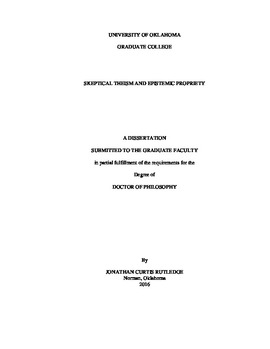| dc.description.abstract | Contemporary proponents of the problem of evil argue that evil is evidence, even strong evidence, against the existence of God. Next, these so-called atheologians claim that having such evidence against God’s existence suffices for reasonably believing that God does not exist. In response to this argument, skeptical theists claim that humans are not cognitively proficient when it comes to determining whether or not the evils we see are actually incompatible with the existence of a God. As a result, they deny that the evils we witness constitute evidence (or in some cases, strong evidence) against God’s existence. In this dissertation, I argue that whether evil constitutes evidence against God’s existence depends on a number of details concerning the particular epistemic perspective through which experiences of evil are filtered and that even if evil is evidence (so-construed) against God’s existence, it does not suffice for reasonable belief in the non-existence of God. In chapter 1, I set the stage for our discussion by explaining where skeptical theism fits in as a response to the argument from evil. In chapter 2, I argue against the traditional skeptical theistic position that evil is not evidence of any sort against God’s existence. In chapter 3, I explore and develop a more modest approach to skeptical theism: the epistemic principles approach. In chapter 4, I consider analogical arguments which aim to establish the reasonability of applying such epistemic principles to the argument from evil. In chapter 5, I draw from the shortcomings of the projects explored in the previous chapters to develop a perspectival theory of epistemic rationality and defeat resulting in a new form of skeptical theism called perspectival skeptical theism. Finally, in chapter 6, I offer a retelling of the argument from evil, and in so doing, explain succinctly how perspectival skeptical theism improves on the more traditional forms of skeptical theism and can be used to supplement, rather than replace, other sorts of responses to the argument from evil. | en_US |
